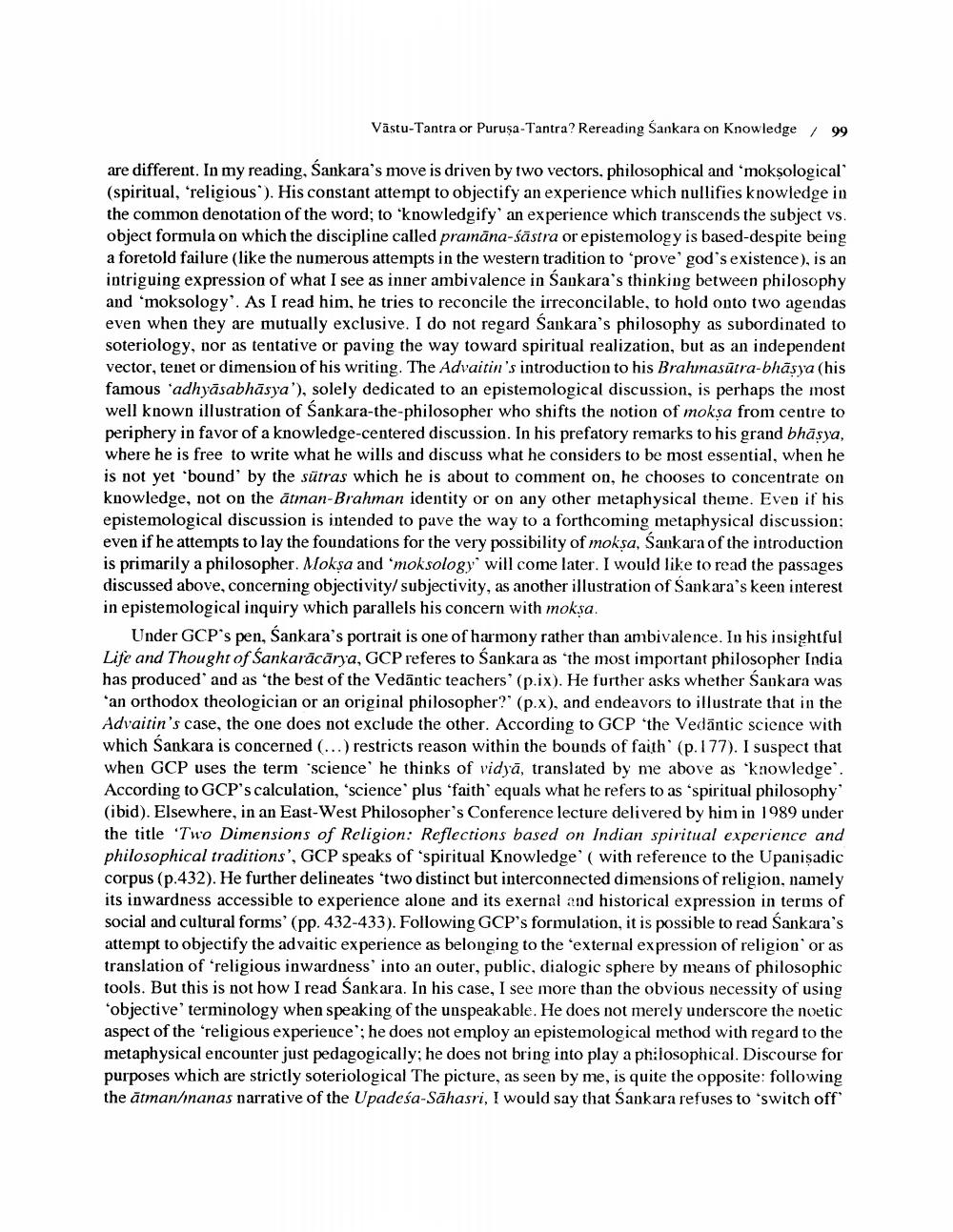________________
Vastu-Tantra or Purușa-Tantra? Rereading Sankara on Knowledge / 99
are different. In my reading, Sankara's move is driven by two vectors, philosophical and 'moksological (spiritual, 'religious"). His constant attempt to objectify an experience which nullifies knowledge in the common denotation of the word; to 'knowledgify' an experience which transcends the subject vs. object formula on which the discipline called pramana-sästra or epistemology is based-despite being a foretold failure (like the numerous attempts in the western tradition to 'prove' god's existence), is an intriguing expression of what I see as inner ambivalence in Sankara's thinking between philosophy and 'moksology'. As I read him, he tries to reconcile the irreconcilable, to hold onto two agendas even when they are mutually exclusive. I do not regard Sankara's philosophy as subordinated to soteriology, nor as tentative or paving the way toward spiritual realization, but as an independent vector, tenet or dimension of his writing. The Advaitin's introduction to his Brahmasutra-bhāṣya (his famous 'adhyāsabhāsya'), solely dedicated to an epistemological discussion, is perhaps the most well known illustration of Sankara-the-philosopher who shifts the notion of mokṣa from centre to periphery in favor of a knowledge-centered discussion. In his prefatory remarks to his grand bhāṣya, where he is free to write what he wills and discuss what he considers to be most essential, when he is not yet 'bound' by the sutras which he is about to comment on, he chooses to concentrate on knowledge, not on the atman-Brahman identity or on any other metaphysical theme. Even if his epistemological discussion is intended to pave the way to a forthcoming metaphysical discussion: even if he attempts to lay the foundations for the very possibility of moksa, Sankara of the introduction is primarily a philosopher. Mokṣa and 'moksology will come later. I would like to read the passages discussed above, concerning objectivity/subjectivity, as another illustration of Sankara's keen interest in epistemological inquiry which parallels his concern with moksa.
Under GCP's pen, Sankara's portrait is one of harmony rather than ambivalence. In his insightful Life and Thought of Sankaracarya, GCP referes to Sankara as 'the most important philosopher India has produced' and as 'the best of the Vedantic teachers' (p.ix). He further asks whether Sankara was *an orthodox theologician or an original philosopher?" (p.x), and endeavors to illustrate that in the Advaitin's case, the one does not exclude the other. According to GCP 'the Vedantic science with which Sankara is concerned (...) restricts reason within the bounds of faith' (p.177). I suspect that when GCP uses the term 'science' he thinks of vidya, translated by me above as 'knowledge". According to GCP's calculation, 'science' plus 'faith' equals what he refers to as 'spiritual philosophy (ibid). Elsewhere, in an East-West Philosopher's Conference lecture delivered by him in 1989 under the title 'Two Dimensions of Religion: Reflections based on Indian spiritual experience and philosophical traditions", GCP speaks of 'spiritual Knowledge' (with reference to the Upanisadic corpus (p.432). He further delineates 'two distinct but interconnected dimensions of religion, namely its inwardness accessible to experience alone and its exernal and historical expression in terms of social and cultural forms' (pp. 432-433). Following GCP's formulation, it is possible to read Sankara's attempt to objectify the advaitic experience as belonging to the 'external expression of religion" or as translation of 'religious inwardness' into an outer, public, dialogic sphere by means of philosophic tools. But this is not how I read Sankara. In his case, I see more than the obvious necessity of using 'objective' terminology when speaking of the unspeakable. He does not merely underscore the noetic aspect of the 'religious experience'; he does not employ an epistemological method with regard to the metaphysical encounter just pedagogically; he does not bring into play a philosophical. Discourse for purposes which are strictly soteriological The picture, as seen by me, is quite the opposite: following the atman/manas narrative of the Upadesa-Sahasri, I would say that Sankara refuses to 'switch off




